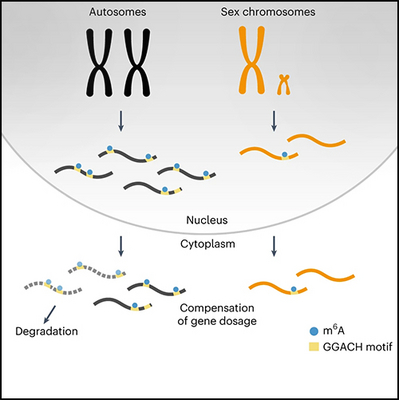Gene expression on the X chromosome is balanced via RNA methylation
RESEARCH HIGHLIGHTS
19 May – Researchers at the Institute of Molecular Biology (IMB) in Mainz, Germany, have discovered how mammals balance the expression of genes on the X chromosome with those on other chromosomes (known as autosomes). The key to this balancing act lies in methylating bases on mRNAs from autosomes, but not those from the X chromosome. This reduces the stability of autosome mRNAs such that they are kept at a precisely 1:1 ratio with X chromosome mRNAs. Maintaining this balance in expression is extremely important for the normal development and function of organisms.
Mammals inherit two copies of each chromosome, one from the father and one from the mother. The exception is the sex chromosomes: females have two copies of the X chromosome, while males have a single X and a Y chromosome. In females, one of the X chromosome copies is inactivated. This means that genes on the X chromosome are always expressed from only a single copy in both males and females, while genes on all other chromosomes (known as autosomes) are expressed from two copies.
Having an unequal gene copy number can be extremely detrimental to organismal function, as genes present in only one copy would be expressed at only half the level of those present in two copies. This would be like having only one X chromosome factory producing mRNAs, while all the autosomes have two factories, resulting in twice as many autosome mRNAs. Such imbalances typically cause genetic diseases such as Down’s syndrome in humans. So how is it that mammals function normally with only one active X chromosome?
Scientists reasoned that mammals must have some compensatory mechanism to balance the expression of X chromosome and autosome genes. However, this mechanism had remained elusive until now. In a new study published in the journal Nature Structural & Molecular Biology, Julian König and his group, together with the group of his colleague Claudia Keller Valsecchi (both at IMB), have shown that mammals use RNA modifications to help achieve this balance.
RNAs can be post-transcriptionally modified to regulate their translation, processing and stability. Scientists know of over 100 RNA modifications, but the most common is adenosine methylation (m6A), which destabilises RNAs so that they are more rapidly degraded and recycled.
By manipulating the levels of m6A in mouse embryonic stem cells, Julian and his colleagues discovered that m6A mostly affects the stability of mRNAs from the autosomes but not those from the X chromosome. In agreement with this, they found that X chromosome mRNAs have significantly less m6A than autosome mRNAs. In other words, the autosomes may have two factories producing twice as many mRNAs, but because the autosome mRNAs are modified with m6A they break down and are removed from the cell faster than X chromosome mRNAs. The researchers propose that the cell uses this mechanism to keep mRNAs from the X chromosome and autosomes present in equal amounts, even though the X chromosome only has one active ‘factory’. These observations also hold true for human cell lines, suggesting that this mechanism may be common to all mammals.
Based on these results, the researchers hypothesise that mammalian X chromosome genes have evolved to produce mRNAs with less m6A so they can be more highly expressed, despite being present in only one active copy.
Nadine Körtel and Cornelia Rücklé, the two first authors of the study, say “We are so excited to have unlocked a key piece of the puzzle of how mammals ensure a balanced expression of genes in the unique case of the X chromosome.” By studying how mammals naturally balance the expression of X chromosome genes, the researchers also hope to gain a better understanding of how gene expression is balanced (or unbalanced) in other situations of unequal gene copy number during embryonic development and ageing, as well as in genetic diseases.
Further details
Further information can be found at www.nature.com/articles/s41594-023-00997-7.
Julian König is a Group Leader at the Institute of Molecular Biology (IMB). Further information about research in the König lab can be found at www.imb.de/koenig.
Claudia Keller-Valsecchi is a Group Leader at the Institute of Molecular Biology (IMB). Further information about research in the König lab can be found at www.imb.de/keller-valsecchi.
About the Institute of Molecular Biology gGmbH
The Institute of Molecular Biology gGmbH (IMB) is a centre of excellence in the life sciences that was established in 2011 on the campus of Johannes Gutenberg University Mainz (JGU). Research at IMB focuses on the cutting-edge fields of epigenetics, genome stability, ageing and RNA biology. The institute is a prime example of successful collaboration between a private foundation and government: The Boehringer Ingelheim Foundation has committed 154 million euros to be disbursed from 2009 until 2027 to cover the operating costs of research at IMB. The State of Rhineland-Palatinate has provided approximately 50 million euros for the construction of a state-of-the-art building and is giving a further 52 million in core funding from 2020 until 2027. For more information about IMB, please visit: www.imb.de.
Boehringer Ingelheim Foundation
The Boehringer Ingelheim Foundation is an independent, non-profit organization that is committed to the promotion of the medical, biological, chemical, and pharmaceutical sciences. It was established in 1977 by Hubertus Liebrecht (1931–1991), a member of the shareholder family of the Boehringer Ingelheim company. Through its Perspectives Programme Plus 3 and its Exploration Grants, the Foundation supports independent junior group leaders. It also endows the international Heinrich Wieland Prize, as well as awards for up-and-coming scientists in Germany. In addition, the Foundation funds institutional projects in Germany, such as the Institute of Molecular Biology (IMB), the department of life sciences at the University of Mainz, and the European Molecular Biology Laboratory (EMBL) in Heidelberg.
Press contact for further information
Dr Ralf Dahm, Director of Scientific Management
Institute of Molecular Biology gGmbH (IMB), Ackermannweg 4, 55128 Mainz, Germany
Phone: +49 (0) 6131 39 21455, Email: press(at)imb.de
